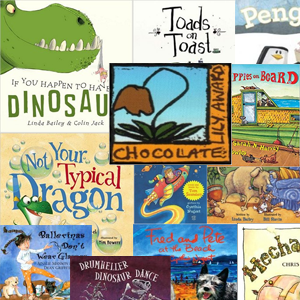Award of the Week: Carter G. Woodson Book Award
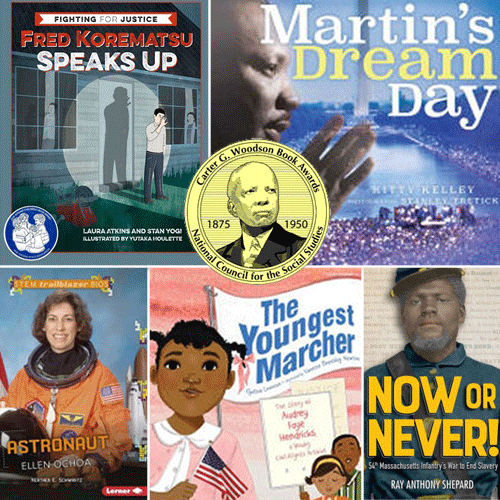
In 1974, National Council for the Social Studies established the Carter G. Woodson Book Award for the most distinguished social science books appropriate for young readers that depict ethnicity in the United States. The purpose of this award is to encourage the writing, publishing, and dissemination of outstanding social science books for young readers that treat topics related to ethnic minorities and relations sensitively and accurately.
Carter G. Woodson was a distinguished African American historian and educator who wrote books for adults and young people. Dr. Woodson received his Ph.D. in history from Harvard University, and wrote many black history books as well as the seminal volume on education, Miseducation of the Negro.
| 2018 | |
| Elementary Level Winner | |
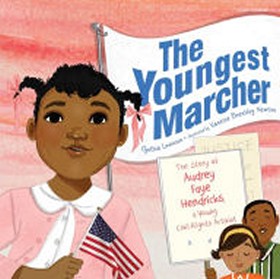
|
The Youngest Marcher: the Story of Audrey Faye Hendricks, a Young Civil Rights Activist By: Cynthia Levinson Illustrated by: Vanessa Brantley-Newton Nine-year-old Audrey Faye Hendricks was used to hearing discussions about the civil rights movement, seeing as Fred Shuttlesworth, Jim Bevel, and Martin Luther King, Jr. were often dinner guests in her home. Believing she could make a difference too, Audrey marched with other children in Birmingham, Alabama in 1963. She and the other children were arrested and spent a week in jail, which is depicted in the illustrations. |
| Elementary Level Honoree | |
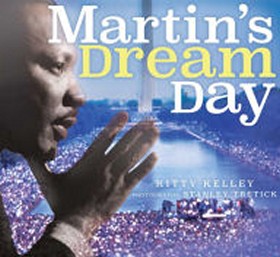
|
Martin’s Dream Day By: Kitty Kelley Illustrated by: Stanley Tretick Celebrity biographer Kelley offers an account of the 1963 March on Washington, paired to the images of acclaimed photojournalist Tretick. |
| Middle Level Winner | |
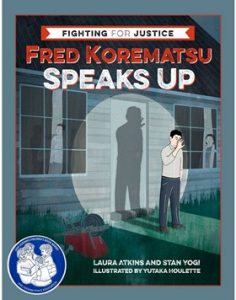
|
Fighting for Justice: Fred Korematsu Speaks Up By: Laura Atkins and Stan Yogi Illustrated by: Yutaka Houlette When Fred Korematsu, a young Japanese-American man, defied U.S. governmental orders by refusing to report to prison camps during World War II, he and his allies set in motion a landmark civil liberties case. Drawing heavily on the recollections of two of Fred’s children, the book details Korematsu’s upbringing in Oakland, California, his imprisonment for resisting internment, his quest to legally marry his white wife, and his 40-year legal battle. |
| Middle Level Honoree | |
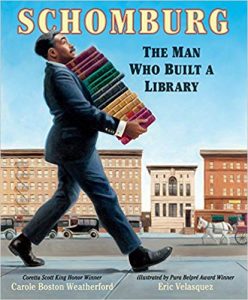
|
Schomburg: The Man Who Built A Library By: Carole Boston Weatherford Illustrated by: Eric Velasquez Amid the scholars, poets, authors, and artists of the Harlem Renaissance stood an Afro-Puerto Rican named Arturo Schomburg. This law clerk’s life’s passion was to collect books, letters, music, and art from Africa and the African diaspora and bring to light the achievements of people of African descent through the ages. When Schomburg’s collection became so big it began to overflow his house (and his wife threatened to mutiny), he turned to the New York Public Library, where he created and curated a collection that was the cornerstone of a new Negro Division. A century later, his groundbreaking collection, known as the Schomburg Center for Research in Black Culture, has become a beacon to scholars all over the world. |
| Secondary Level Winner | |
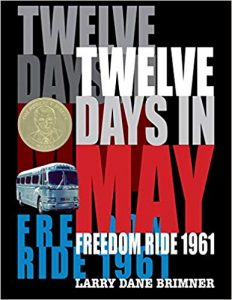
|
Twelve Days in May: Freedom Ride 1961 By: Larry Dane Brimner For twelve history-making days in May 1961, thirteen black and white civil rights activists, also known as the Freedom Riders, traveled by bus into the South to draw attention to the unconstitutional segregation still taking place. Despite their peaceful protests, the Freedom Riders were met with increasing violence the further south they traveled. |
| Secondary Level Honoree | |
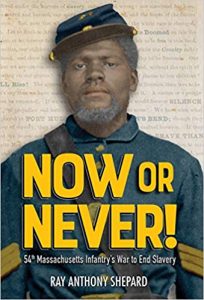
|
Now or Never!: 54th Massachusetts Infantry’s War to End Slavery By: Ray Anthony Shepard The riveting dual biography of two little-known but extraordinary men in Civil War history George E. Stephens and James Henry Gooding. These Union soldiers not only served in the Massachusetts 54th Infantry, the well-known black regiment, but were also war correspondents who published eyewitness reports of the battlefields. Their dispatches told the truth of their lives at camp, their intense training, and the dangers and tragedies on the battlefield. Like the other thousands of black soldiers in the regiment, they not only fought against the Confederacy and the inhumanity of slavery, but also against injustice in their own army. The regiment’s protest against unfair pay resulted in America’s first major civil rights victory; equal pay for African American soldiers. This fresh perspective on the Civil War includes an author’s note, timeline, bibliography, index and source notes. |
Previous winners and honorees can be found at :
https://www.socialstudies.org/awards/woodson/winners

